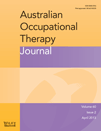New Zealand occupational therapists' views on evidence-based practice: A replicated survey of attitudes, confidence and behaviours
Abstract
Background/aim
Evidence-based practice is internationally recognised as an essential component of contemporary occupational therapy, and as being critical to the future of the profession. However, its uptake by therapists has been modest with barriers such as therapists attitudes, skills and organisational support frequently cited. This study explored New Zealand therapists' perceptions of their behaviours, skills and attitudes regarding evidence-based practice.
Method
A survey comprising open and closed questions was emailed to all therapists holding practicing certificates who had consented to be contacted about research (n = 1587) with 30% (n = 473) of surveys returned. Therapists' evidence-based practice attitudes, skills and behaviours were examined using descriptive statistics. Relationships between therapists' perceptions of evidence-based practice and demographic characteristics of therapists were explored using Chi-square analysis. Text responses were analysed using content analysis.
Results
New Zealand therapists have a positive attitude towards evidence-based practice (84%), but report moderate reference to research literature (56%) during clinical decision-making and moderate (66%) to low (35%) levels of confidence in research-related skills. Therapists with training in evidence-based practice had higher levels of confidence, perceived research as more relevant to practice and reported less barriers to implementing evidence-based practice than other therapists. A perception that evidence-based practice is separate to clinical reasoning was widely held.
Conclusion
New Zealand therapists' evidence-based practice behaviours, skills and attitudes are largely consistent with international comparisons. However, if New Zealand therapists are to enact the ideal of being ‘evidence-based’ then accessible training in evidence-based practice-related skills is indicated and should include education of what evidence-based practice means.




